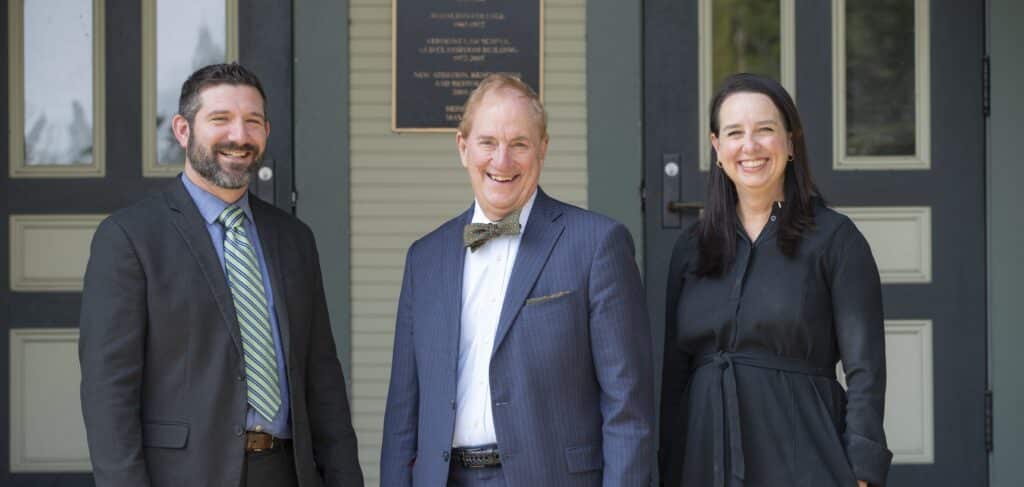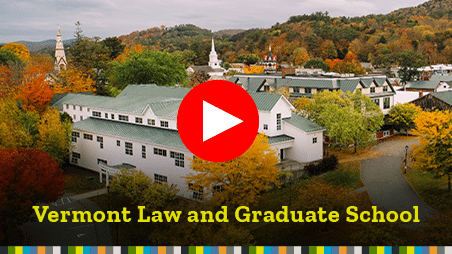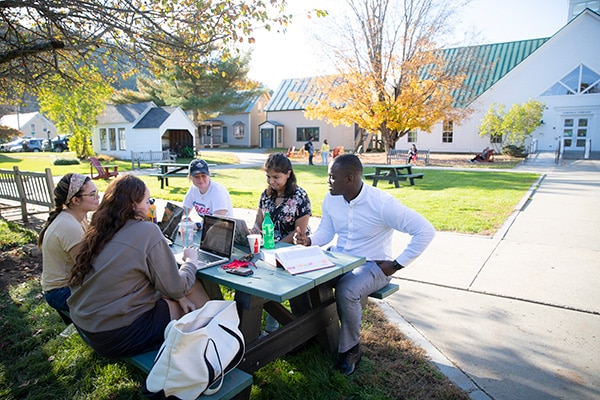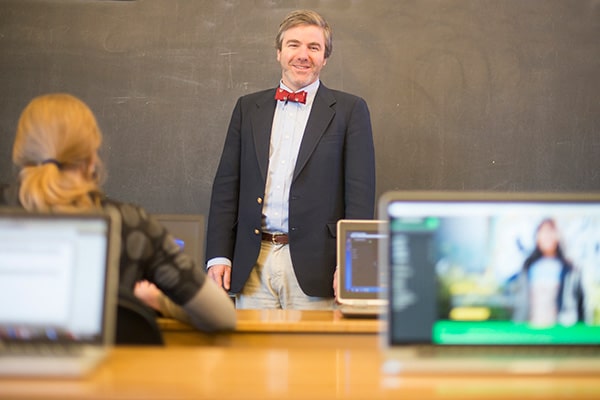
Strategic Plan
Strategic Plan Update
August 2024
Two years after implementing the Vermont Law and Graduate School Strategic Plan, I’m happy to report that Vermont Law and Graduate School is on a path to long-term financial stability and sustainability. We project a modest operating surplus for Fiscal Year 2025, achieving a break-even position two years ahead of the schedule envisioned by the Strategic Plan. With a strong leadership team and unwavering guidance from our Board of Trustees, I’m optimistic about our ability to meet our goals and ensure the continued growth of this great School. Below you’ll find an update on the key strategies outlined in the Strategic Plan, as well as some thoughts on the future of Vermont Law and Graduate School.

Graduate School Dean Dan Bromberg, President Rod Smolla, and Law School Dean Beth McCormack
Key Strategy 1: Transforming Vermont Law School into a graduate institution—Vermont Law and Graduate School—that houses both a law school and graduate school
Vermont Law School has fully transformed into Vermont Law and Graduate School. Our new name and brand can be seen across campus, online, and throughout the thriving community of students, faculty, and staff.
We continue to build awareness of our new identity to raise the visibility of our graduate programs, strengthen our JD programs, and leverage our legacy as a top environmental law school and a leader in restorative justice.
Key Strategy 2: Establishing a new president position to serve as the chief executive of the new structure
With the appointment of Dan Bromberg as dean of the graduate school and Beth McCormack as dean of the law school, our leadership transition is complete. My role as president focuses on high-level strategy, relationship building, and fundraising, while the deans focus on strengthening our academic programming.
Key Strategy 3: Developing three new public policy master’s degrees and enhancing existing ones
Successful fundraising efforts have helped us launch transformative programs that have been demonstrably successful so far. We have launched several public policy master’s degrees—a Master of Public Policy (which incorporates our Master of Animal Protection Policy and Master of Food and Agricultural Policy), an Executive Master of Environmental Policy, and a Master of Climate and Environmental Policy. These offerings serve to make our graduate school programming more robust and competitive.
Key Strategy 4: Launching an Online Hybrid JD program for working professionals
Our Online Hybrid JD program has experienced unprecedented success. We launched this program in 2022 with a cap of 20 students, and in 2023 we received permission from the American Bar Association to admit up to 100 students each year. This fall, we welcome our third entering class of some 100 students, and we anticipate yearly entering classes of approximately 100 or more new students in all future years.
The students in the Online Hybrid JD program take their courses online in the evening. They also visit Vermont for brief residential periods each year. These visits to Vermont are very popular with the students, who find them beneficial for meeting with professors, bonding with fellow students, and experiencing the beauty of Vermont.
As one student shared after the summer residency this year: “The residential period was fantastic. I appreciated how comprehensive it was, especially the opportunity to participate in practical activities like the expungement clinic…I felt proud to be a VLGS student afterward.”
Looking Toward the Future
The Strategic Plan that guides the School’s mission emphasizes the unique identity of Vermont Law and Graduate School, devoted to preparing students as legal and policy advocates for environmental protection, climate response, agricultural and food planning, animal welfare, clean energy, justice reform, and social equity.
How can our School claim an identity that is “unique” in its devotion to these causes, mindful that many institutions and organizations assert prominence and influence in these spaces?
The answer resides in the ethos of Vermont Law and Graduate School as reflected in the character of our people. To be sure, there are many American universities of stature with programs in our fields of expertise. But students who attend large and wealthy institutions often pursue careers that do not directly affect those causes. In contrast, students attend Vermont Law and Graduate School because of its commitment to social change and service to the public interest. Our students arrive as idealists, receive the intellectual and practical advocacy training required to advance those idealistic causes, and leave as champions of them. Their high ideals, now honed and trained, make them changemakers in government, nonprofit organizations, law firms, industry, and their communities. The faculty members who instruct, mentor, and undertake research and advocacy similarly fulfill the School’s goal of supporting informed public policy and private-sector decision-making.
I look forward to continuing the work outlined in our Strategic Plan as we educate the next generation of leaders. Our graduates are committed to causes larger than themselves, and through their work in law and policy, they have the ability to influence and implement the changes our world so desperately needs.
Rod Smolla
President and Professor of Law
Vermont Law and Graduate School
Strategic Plan 2022
Harnessing the momentum and intersectionality of environmentalism and justice reform

The world faces a daunting series of complex challenges. Overcoming these challenges requires bold action, creative thinking, and new approaches. Those attributes are at the heart of a forward-looking strategic plan designed by faculty and staff and adopted by the board of trustees. The plan will help the school achieve a sustainable economic model and ensure further growth in enrollment and institutional reputation by harnessing the momentum and intersectionality of environmentalism and justice reform to use law, policy, and leadership to make a difference.

Key Strategy No. 1 | Implementation Date: Effective July 1, 2022
Transforming VLS into a graduate institution — Vermont Law and Graduate School — that houses both a law school and graduate school
Becoming a graduate institution will provide the foundation needed for unhindered programmatic growth, raise the visibility of the master’s programs, strengthen the JD program, elevate the school’s world-renowned environmental program and first-of-its-kind restorative justice program, and appeal to a wider audience of prospective students and donors. Importantly, the new structure will allow Vermont Law and Graduate School to pursue increased enrollments and maintain the flexibility to more easily add programs and degrees in response to market conditions and enrollment trends.
Key Strategy No. 2 | Implementation Date: Effective July 1, 2022
Establishing a new president position to serve as the chief executive of the new structure
Bifurcating what has up to this point been a joint president/dean position will allow the president to have an enhanced focus on the higher-level strategies and external relationships that are important to the future of the school, and the strategic plan itself. Chief among their responsibilities will be securing transformational gifts and championing a comprehensive fundraising campaign. The plan also establishes separate dean positions for both the law and graduate schools.


Key Strategy No. 3 | Implementation Date: Fall 2023
Developing three new public policy master’s degrees and enhancing existing ones
Changes to the school’s master’s degree offerings—including three new degrees focused on climate change, environmental justice, animal protection, and equity—will enhance the rigor of the school’s master’s programs, provide greater relevancy and value to today’s students, and respond to the world’s most pressing needs. The new degrees are a Master of Climate and Environmental Policy (residential and online), an Executive Master of Environmental Policy (online only), and a Master of Animal Protection Policy (residential and online). These new degrees are public policy degrees and feature a robust set of core and environmental policy courses. This new curriculum, aspects of which will also be added to the existing Master of Energy Regulation and Law and Master of Food and Agriculture Law Policy degrees, will produce graduates with increased practical skills and enhanced career prospects. Additionally, look for exciting new programmatic news later this summer.
Key Strategy No. 4 | Implementation Date: Fall 2022
Launching an Online Hybrid JD program for working professionals
Beginning with its first class this fall, the new part-time Online Hybrid JD program will allow working professionals to earn a law degree while earning an income from anywhere in the country all while offering the same rigorous legal education as the residential JD. Delivered through a mixture of online classes and three brief, in-person residential sessions, the Online Hybrid JD will offer students the opportunity to specialize in environmental law, food and agriculture law, energy law, or restorative justice. Basing the program at the school’s Burlington facility leverages the city’s proximity to the largest legal and student communities in Vermont, as well as the convenience of being near ample amenities.

Planning for the future: 18 months and more than 700 stakeholders
The strategic plan summarized here is the result of an 18-month process that ultimately included more than 60 faculty and staff participating in working groups and committees. They solicited and received feedback from more than 700 alumni, students, prospective students, staff, faculty, and funders through surveys, town halls, focus groups, Q&A sessions, facilitated discussion groups, and more. This plan is the collective best work of an immensely talented and dedicated school community.
The largest donation in the school’s history to support the new direction
The new strategic plan received overwhelmingly affirmative votes of confidence from the board of trustees, faculty, and staff, but those are not the only groups who are enthusiastic about it. A foundation that wishes to remain anonymous has committed to donating $8 million to the school over a three- year period, with the bulk of the funding directly supporting the plan’s initiatives as well as the school’s signature environmental programs. This transformative gift, the largest in the school’s history, signals significant external support for the schools new direction and creates tremendous momentum for its implementation.